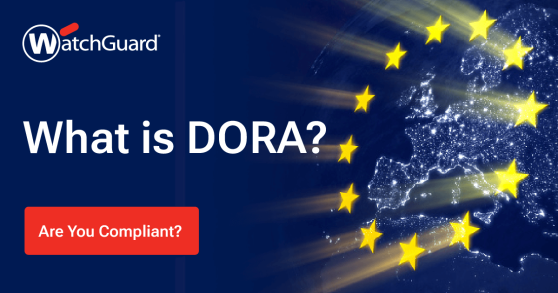Understanding DORA: The New European Regulation

With the rise in cyberattacks, robust measures are essential to reduce attack surfaces and respond swiftly to threats. Compliance with regulations like the Digital Operational Resilience Act (DORA) is crucial to prevent severe penalties and ensure business continuity. This blog post looks at DORA and introduces our white paper about this important new European regulation.
What Is DORA?
The Digital Operational Resilience Act (DORA) Regulation (EU) 2022/2554 will take effect on January 17, 2025, for all EU member states. It aims to fortify the cybersecurity frameworks of financial entities and digital products within the EU, ensuring they can handle ICT-related incidents and operational disruptions. DORA covers various financial entities, including banks, investment firms, credit institutions, insurance companies, crowdfunding platforms, and critical third-party service providers such as Cloud service vendors and data centers.
Why Is Compliance Important?
Failure to comply with DORA can result in severe penalties, including daily fines of up to 1% of the average daily global turnover for up to six months, issuance of cease-and-desist orders, and public notices. These stringent penalties underscore the importance of adhering to DORA’s requirements.
Essential Requirements and How WatchGuard Supports Them
- ICT Risk Management: Financial entities must establish a comprehensive ICT (information and communication technology) risk management framework to ensure operational continuity during cyber incidents. WatchGuard offers solutions like firewalls, endpoint security (EPP, EDR, EPDR, Advanced EPDR), patch management, and full encryption to support these requirements.
- Incident Management: Entities must monitor, manage, and follow up on ICT-related incidents, identifying root causes and taking preventive measures. WatchGuard’s ThreatSync (XDR), ThreatSync+ NDR, and MDR services provide continuous monitoring, automated incident responses, and detailed incident data management.
- Resilience Testing: DORA mandates rigorous resilience testing, including vulnerability assessments, penetration testing, and scenario-based testing. WatchGuard’s ThreatSync+ NDR, endpoint security solutions, and secure Wi-Fi testing capabilities facilitate these resilience tests.
- Third-Party Risk Management: DORA mandates managing third-party ICT service providers through contracts addressing security, data protection, and service availability. WatchGuard’s Firebox network access controls, ThreatSync+ NDR, Endpoint Security solutions, and MDR services help mitigate third-party risks.
- Information Sharing: DORA encourages financial institutions to share threat intelligence to enhance collective cyber resilience. WatchGuard’s EPDR, Advanced EPDR, Orion, and WatchGuard MDR reports provide detailed incident information and reporting for sharing threat intelligence.
Why Download Our DORA Paper?

Our detailed paper, "A Deep Dive into DORA," provides an in-depth look at how WatchGuard’s products and services support compliance with DORA requirements. By integrating WatchGuard’s Unified Security Platform, financial entities can maintain a robust and compliant ICT environment through risk management, incident handling, resilience testing, third-party risk management, and information sharing.
Conclusion
WatchGuard's Unified Security Platform is designed to exceed industry standards and help businesses comply with evolving regulations. Our Cloud-native Unified Security Platform and SaaS products support regular updates and security enhancements, which are essential for maintaining compliance and securing digital infrastructure. Key capabilities include comprehensive security, simplified management, proactive threat management, and attack surface monitoring and reduction.
To learn more about how WatchGuard can help you comply with DORA and enhance your cybersecurity framework, download our detailed paper from here.


